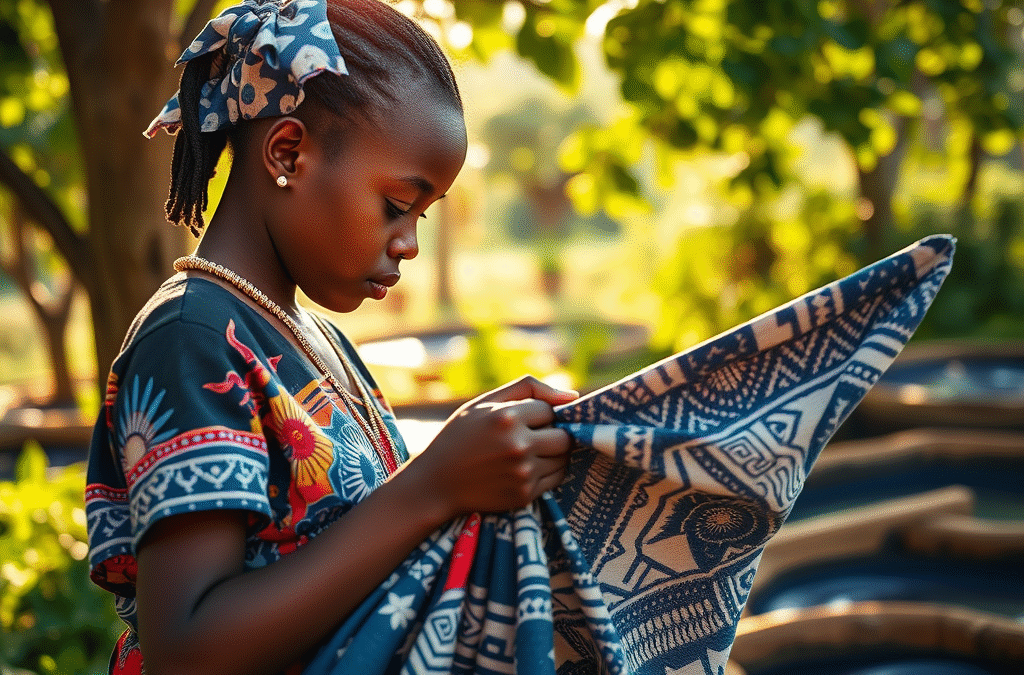The Story of Adire: Weaving a Legacy in Indigo
In the heart of southwestern Nigeria, nestled among the lush green landscapes of Abeokuta, there lived a young girl named Abeni. She came from a long line of dyers and weavers, her ancestors known for their mastery of the ancient craft of Adire, a textile tradition that had been passed down through generations.
Adire, a name that means “tied and dyed” in the Yoruba language, was more than just fabric to the people of Abeni’s village—it was a symbol of identity, storytelling, and cultural pride. Each piece told a unique story, woven from the hands of artisans, dyed in deep indigo pools, and patterned with intricate designs that mirrored the life and spirit of the people.
Abeni’s mother, Iya Adeola, was revered as one of the finest Adire makers in the land. Her clothes were sought after from far and wide, each bearing motifs of animals, plants, and abstract symbols that spoke of wisdom, fertility, and courage. Abeni had grown up watching her mother dip the long, soft cotton fabrics into vats of rich, natural indigo dye, carefully folding, tying, and stitching them in complex patterns before they were transformed into something magical.
Every morning, Abeni would sit beside her mother as she worked, eager to learn the secrets of Adire. But mastering the craft wasn’t just about learning the techniques—it was about understanding the soul of the fabric, the connection to the earth and the ancestors. Iya Adeola often told Abeni, “The indigo is alive, my daughter. It listens to our stories, it carries our dreams. You must be patient. Adire will reveal itself when you are ready.”
One day, a great festival was announced in the kingdom. It was to be a celebration of heritage, and artisans from all over were invited to present their finest works. Abeni’s mother began working on a new piece—a large, flowing cloth that would capture the essence of their people’s journey, from the rolling hills of Abeokuta to the bustling markets of Lagos. It was to be the most intricate Adire she had ever created.
But a few days before the festival, Iya Adeola fell gravely ill. She could no longer work, and the half-finished fabric lay untouched. Abeni knew how much this festival meant to her mother, so she made a brave decision. With trembling hands, she picked up the cloth and decided to complete it herself.
Though she had watched her mother for years, Abeni had never made an Adire piece of her own. The process was delicate, requiring not just skill but intuition. She began by sketching the designs in wax, inspired by the stories her mother had told her—of the mighty river Ogun that flowed through their lands, of the wise tortoise that outwitted the hunter, and of the stars that watched over them at night.
As she tied, folded, and stitched the fabric, she felt the presence of her ancestors guiding her. She remembered her mother’s words about the indigo being alive, and when she dipped the fabric into the deep blue dye, it felt as if the dye itself was responding to her touch. After days of painstaking work, Abeni removed the cloth from the dye for the final time. Unfolding it, she was in awe. The patterns shimmered under the sun, the deep blues and whites flowing like rivers of storytelling woven into the fabric.

When the day of the festival arrived, Abeni carried the finished Adire to the marketplace. People marvelled at its beauty, at the intricate designs that seemed to come alive with meaning. The elders of the village, who knew the language of the patterns, could see the stories embedded in the fabric—the tale of resilience, the journey of their ancestors, and the unity of their people. They declared it a masterpiece.
Abeni’s mother, still weak but full of pride, smiled as she saw her daughter honoured by the king and the village. “You have learned well, my daughter,” Iya Adeola whispered. “The Adire speaks through you now.”
From that day, Abeni became known as a master of Adire, carrying forward the legacy of her ancestors, but with her own unique voice. She continued to tell the stories of her people through cloth, each piece a living testament to the power of tradition, identity, and creativity. And in every indigo-dyed fabric she made, the spirit of her mother and their ancestors lived on.
Written by Omasmite (The Adire Shop)
Shop A111 New Alade market, Allen bus stop, Ikeja. Lagos Nigeria

